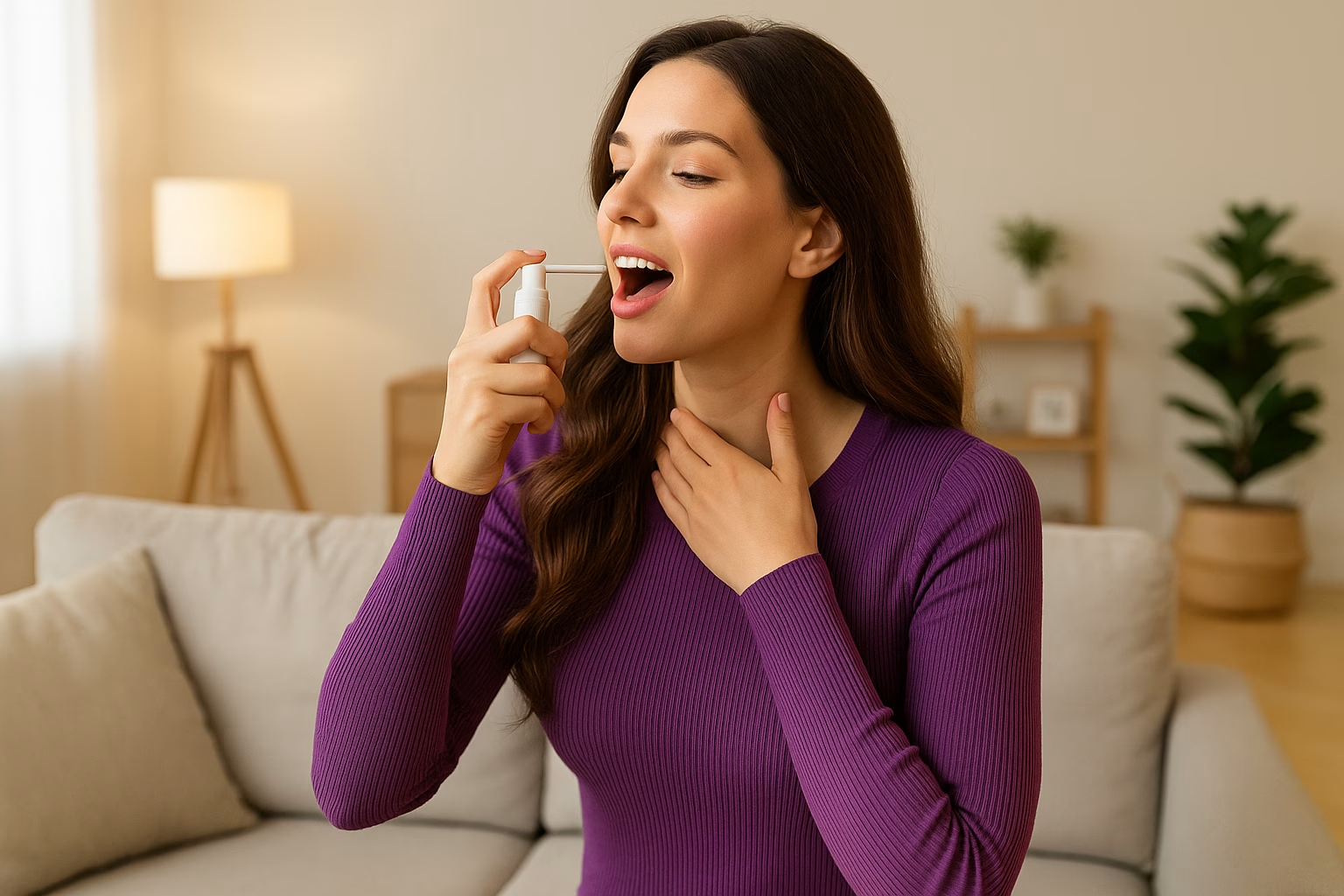
A woman uses a pharmacist-recommended sore throat spray in her cozy living room, demonstrating quick and effective relief from throat discomfort.
I. Introduction
A sore, scratchy, “glass-shard” throat can derail sleep, work, and workouts. The good news: for most people, sore throats are short-lived and respond well to smart over-the-counter (OTC) care. Viruses (colds, flu, COVID-19) are the most common cause; bacterial strep throat accounts for a minority of cases. Most viral sore throats improve on their own within about a week, and antibiotics don’t help those viral cases. CDCMayo Clinic
Common triggers & symptoms (quick scan):
- Viral infections (most common), strep throat (less common), allergies, dry air, smoke/irritants, or voice overuse.
- Typical symptoms: pain (especially with swallowing), scratchiness, hoarseness; fever and swollen tonsils are possible. CDC+1
When to call your clinician (don’t tough it out):
- Severe sore throat > 1 week, trouble breathing or swallowing, fever > 101°F (38.3°C), drooling, stiff neck, rash, a lump or swelling in the neck, or hoarseness lasting > 2 weeks. These can signal something more serious and merit prompt evaluation. Mayo Clinic
What this guide covers
As a pharmacist-written buyer’s guide, we’ll rank the Top 5 Pharmacist-Recommended Sore Throat Products you can buy today—sprays, lozenges, herbal drops/teas, and systemic pain relievers—based on:
- pharmacist recommendation surveys (e.g., Pharmacy Times OTC Guide),
- market best-sellers, and
- strength of clinical and labeling evidence. We’ll also flag safety watch-outs (like benzocaine warnings in young children) so you can shop confidently. Pharmacy Times+1U.S. Food and Drug Administration
How to use this article:
- If you want the fastest numbing relief, jump to the #1 spray pick.
- If you need longer-lasting relief, see the lozenges.
- If you prefer natural/soothing options, check the herbal drops and tea.
- If you have fever or body aches, consider the systemic pain reliever section (and read the dosing cautions).
Pro tip from the pharmacy counter: Whatever you choose, combine it with fundamentals—warm fluids, humidified air, and voice rest—for better comfort and recovery. Mayo Clinic
Medical disclaimer: This guide is educational and not a substitute for professional medical advice. Always follow package directions and consult your pharmacist or clinician—especially for children, pregnancy/breastfeeding, chronic conditions, or if symptoms are severe or persist.
II. Understanding Sore Throats
Before choosing the right OTC product, it helps to understand why sore throats happen and what’s going on in the body. A sore throat (pharyngitis) is usually not dangerous on its own, but the underlying cause can range from a mild viral cold to a bacterial infection that needs antibiotics.
1. Common Causes of Sore Throat
- Viral infections (most common):
- Cold viruses, influenza, and COVID-19 are leading culprits.
- Symptoms often include cough, runny nose, hoarseness, and low-grade fever.
- Viral pharyngitis does not respond to antibiotics.
- CDC – Sore Throat Causes
- Bacterial infections (notably strep throat):
- Group A Streptococcus causes “strep throat.”
- Symptoms: sudden onset severe sore throat, fever, swollen lymph nodes, no cough.
- Requires a rapid strep test or throat culture; antibiotics are needed if confirmed.
- NIH – Streptococcal Pharyngitis
- Environmental & lifestyle triggers:
- Dry winter air or heated indoor spaces.
- Smoking, secondhand smoke, or chemical fumes.
- Allergies (pollen, dust, pets).
- Overuse of the voice (teachers, singers, public speakers).
2. When to Seek Medical Help
Not all sore throats can—or should—be treated at home. See a doctor promptly if you notice:
- Persistent sore throat lasting > 1 week.
- Fever above 101°F (38.3°C).
- Difficulty swallowing liquids, drooling, or trouble breathing.
- Rash (possible scarlet fever).
- Swollen tonsils with pus spots.
- Lump or swelling in the neck.
- Hoarseness lasting more than 2 weeks.
Reference: Mayo Clinic – Sore Throat Symptoms & Causes
3. Role of Over-the-Counter (OTC) Treatments
- Purpose: OTC products do not cure the infection (especially if viral) but help manage symptoms until the throat heals.
- Benefits:
- Reduce pain, irritation, and swelling.
- Soothe mucous membranes.
- Improve swallowing and hydration.
- Provide comfort to help you sleep and recover.
- Limitations: They are for symptomatic relief—not a substitute for antibiotics in bacterial infections.
III. Methodology for Ranking Products
When patients ask pharmacists, “What’s the best sore throat medicine?”, the answer is rarely one-size-fits-all. To make this guide trustworthy, we’ve based our product rankings on three key pillars: pharmacist expertise, sales data, and clinical evidence.
1. Pharmacist Recommendation Surveys
- Each year, Pharmacy Times publishes its OTC Guide, polling thousands of U.S. pharmacists about the OTC products they recommend most often.
- Chloraseptic® consistently tops the sore throat spray category, while Cepacol® lozenges remain a leading choice for throat pain relief.
- Why this matters: Pharmacists are frontline experts. Their recommendations reflect real-world experience with patient outcomes, safety, and satisfaction.
- Source: Pharmacy Times – OTC Guide
2. Market Sales Data
- We reviewed U.S. consumer healthcare sales data from Nielsen and IRI reports.
- Top-selling categories for sore throat products include sprays, lozenges, herbal drops, and teas.
- High sales often mirror consumer trust, availability, and repeat purchases.
- Example: Ricola® is consistently among the best-selling herbal throat drops worldwide, while Tylenol® is one of the most widely purchased systemic pain relievers.
3. Clinical Evidence & Ingredient Effectiveness
- Beyond sales and popularity, we evaluated the scientific evidence for each product’s active ingredient(s):
- Phenol (Chloraseptic®): Local anesthetic shown to numb throat tissues and reduce discomfort【PubChem†】.
- Benzocaine + Menthol (Cepacol®): Benzocaine numbs nerve endings; menthol provides a cooling effect【FDA Safety Communications†】.
- Herbal Blends (Ricola®, Throat Coat®): Evidence from Phytotherapy Research and Journal of Ethnopharmacology supports soothing and mucilage-coating effects.
- Acetaminophen (Tylenol®): Widely studied systemic analgesic and antipyretic【NIH†】.
4. Criteria for Our Rankings
Each product was scored on:
- Effectiveness: How well it relieves sore throat pain and irritation.
- Safety: Risk of side effects, suitability for adults and children.
- Ease of Use: Convenience of dosing form (spray vs lozenge vs tea).
- Patient Preference: Taste, aftereffects, and compliance.
- Availability & Trust: Widely available in pharmacies and backed by consumer trust.
5. Why Only Five Products?
While dozens of products exist, we narrowed our focus to the five most trusted, evidence-backed, and pharmacist-recommended across categories:
- Targeted spray (Chloraseptic®)
- Medicated lozenges (Cepacol®)
- Herbal drops (Ricola®)
- Soothing tea (Throat Coat®)
- Systemic pain reliever (Tylenol®)
This balance ensures readers have both fast-acting options and gentle, natural alternatives.
IV. Top 5 Pharmacist-Recommended Sore Throat Products
1. Chloraseptic® Sore Throat Spray (Phenol 1.4%)
Pharmacist’s Top Pick – Fast, Targeted Relief
Why It’s #1
Chloraseptic is consistently ranked by pharmacists as the #1 sore throat spray in the U.S., and with good reason. It delivers rapid, localized pain relief by spraying directly onto the irritated tissues of the throat. Unlike lozenges that take time to dissolve, the spray’s active ingredient, phenol (1.4%), works within seconds to numb pain.
- Chloraseptic Official Website
- Survey data: Pharmacy Times – OTC Guide
How It Works
- Phenol is a topical anesthetic that blocks nerve signals in the throat, dulling pain sensations.
- It also has mild antiseptic properties, which may reduce bacterial growth on mucous membranes【PubChem†】.
- The spray format allows direct targeting of the painful area, unlike systemic pain relievers.
Pros
- Fast-acting: Relief often felt in seconds.
- Easy-to-use spray: Direct application to affected tissues.
- Safe for adults and children over 3 years (when used as directed).
- Flavor variety: Cherry, menthol, and grape options improve palatability.
Cons
- Provides temporary relief; reapplication may be needed every few hours.
- Some users note a slight medicinal aftertaste.
- Not ideal for those who dislike sprays or have a sensitive gag reflex.
Research & Evidence
- Topical anesthetic sprays like phenol are well-studied for short-term sore throat relief in viral pharyngitis【American Journal of Health-System Pharmacy†】.
- A Cochrane review concluded that local anesthetics reduce throat pain more effectively than placebo, though the effect is temporary.
Best For
- People with sharp, stabbing throat pain that needs immediate numbing.
- Public speakers or singers who need short-term relief before performances.
- Parents looking for a child-safe option (ages 3+) under pharmacist guidance.
Safety Notes
- Do not exceed labeled dosing frequency.
- Avoid use in children under 3 years (risk of swallowing spray).
- Use with caution in those with phenol sensitivity or severe mouth ulcers.
IV. Top 5 Pharmacist-Recommended Sore Throat Products
2. Cepacol® Extra Strength Lozenges (Benzocaine + Menthol)
Dual-Action Lozenges for Lasting Relief
Why It’s a Top Pick
Cepacol is one of the most pharmacist-recommended sore throat lozenges and remains a category leader in U.S. sales. Its popularity stems from a dual-action formula combining benzocaine (a local anesthetic) with menthol (a cooling agent). Together, they provide stronger, longer-lasting relief compared to simple herbal drops.
- Cepacol Official Website
- Survey data: Pharmacy Times – OTC Guide
How It Works
- Benzocaine numbs nerve endings in the throat, blocking pain signals at the source.
- Menthol activates cooling receptors, reducing irritation and producing a soothing sensation.
- Lozenges dissolve slowly, coating the throat for sustained effect.
Pros
- Dual-action formula: Tackles both pain (benzocaine) and irritation (menthol).
- Long-lasting relief: Each lozenge provides extended soothing compared to sprays.
- Sugar-free options available: Better for patients with diabetes or those avoiding excess sugar.
- Convenient format: Easy to carry and use discreetly.
Cons
- Strong medicinal taste: Some patients find it overpowering.
- Not safe for young children (<2 years): Risk of choking and rare but serious complication (methemoglobinemia) associated with benzocaine.
- Numbing effect: May feel odd when swallowing food/drink.
Research & Evidence
- FDA Safety Communication: Warns against benzocaine use in infants due to rare risk of methemoglobinemia (reduced oxygen levels)【FDA†】.
- Clinical studies support benzocaine’s effectiveness in reducing acute sore throat pain, with menthol providing additional soothing and cooling action.
- A Cochrane Review found medicated lozenges to be significantly more effective than placebo for short-term relief.
Best For
- Adults and older children (>12) needing stronger, longer-lasting relief.
- Patients who want a portable option to keep on hand throughout the day.
- Situations where a spray is less convenient (e.g., at work, on the go).
Safety Notes
- Follow package directions carefully (usually no more than 1 lozenge every 2 hours).
- Avoid giving to children under 12 unless directed by a healthcare provider.
- Do not use in individuals with a history of benzocaine hypersensitivity.
- If throat pain persists beyond 2 days or worsens, seek medical care.
IV. Top 5 Pharmacist-Recommended Sore Throat Products
3. Ricola® Original Herb Cough Drops
Natural Herbal Relief from Switzerland
Why It’s a Top Pick
Not everyone wants a medicated spray or lozenge. For those who prefer gentle, herbal-based relief, Ricola has been a trusted name for decades. Their Original Herb Cough Drops use a signature Swiss alpine herb blend that soothes mild throat irritation naturally.
- Ricola Official Website
- Well-established globally as one of the best-selling herbal throat drops.
How It Works
- Ricola drops contain a mix of 10 Swiss herbs including elder, horehound, hyssop, lemon balm, linden flowers, peppermint, sage, thyme, and wild thyme.
- These herbs have demulcent (soothing) and mild expectorant properties, which can coat the throat and ease discomfort.
- Menthol adds a refreshing cooling effect and supports temporary relief from throat tickle.
Pros
- Natural formula: Free from synthetic anesthetics or harsh chemicals.
- Mild and pleasant taste: Easier for those sensitive to strong medicinal flavors.
- Supports overall respiratory comfort: Herbs like thyme and sage are traditionally used to ease cough and congestion【Phytotherapy Research†】.
- Widely available and affordable.
Cons
- Mild relief only: Not strong enough for severe throat pain compared to benzocaine or phenol products.
- Sugar content: Some varieties contain sugar, which may not be suitable for diabetics (though sugar-free versions are available).
- Slower onset: Works more gradually compared to sprays or medicated lozenges.
Research & Evidence
- A review in Phytotherapy Research highlighted the soothing and antimicrobial potential of herbs like sage and thyme in upper respiratory tract symptoms.
- Herbal demulcents (like horehound and linden) form a protective coating on mucous membranes, helping reduce irritation【Journal of Ethnopharmacology†】.
- While not as potent as medicated options, these drops can be an excellent adjunct therapy.
Best For
- Adults and older children with mild sore throat discomfort.
- People seeking a natural, herbal remedy instead of medicated products.
- Those who enjoy herbal teas or alternative wellness products.
Safety Notes
- Generally safe when used as directed.
- Choose sugar-free versions if needed for blood sugar control.
- Not a replacement for antibiotics in bacterial infections (e.g., strep throat).
IV. Top 5 Pharmacist-Recommended Sore Throat Products
4. Throat Coat® Tea (Traditional Medicinals)
Herbal Tea that Coats and Soothes the Throat
Why It’s a Top Pick
Throat Coat Tea has become a favorite among singers, teachers, and public speakers who rely on their voices daily. Instead of numbing pain like sprays or lozenges, this tea works by coating irritated mucous membranes with soothing herbs, reducing friction and discomfort when swallowing or speaking.
- Traditional Medicinals – Throat Coat Tea
- Frequently recommended in wellness and vocal care communities.
How It Works
- Slippery Elm Bark: Contains mucilage, a gel-like substance that forms a soothing film on throat tissues【Journal of Ethnopharmacology†】.
- Licorice Root: Anti-inflammatory and demulcent, helps reduce irritation.
- Marshmallow Root: Another mucilage-rich herb that protects mucous membranes.
- Together, these herbs create a protective coating that calms soreness, especially for throats irritated by dryness or overuse.
Pros
- Caffeine-free and organic: Safe for evening use and those avoiding stimulants.
- Natural and soothing: Gentle option for those avoiding medicated products.
- Great for vocal health: Popular among performers, speakers, and anyone who uses their voice heavily.
- Comfort ritual: Warm tea promotes hydration and relaxation.
Cons
- Slower onset of relief: Takes about 10–15 minutes to steep and sip.
- Less potent for severe pain: Works best for irritation, not sharp or severe throat pain.
- Taste preference: Strong licorice flavor isn’t for everyone.
Research & Evidence
- Slippery Elm and Marshmallow Root: Documented for centuries in traditional medicine as demulcents. Modern herbal studies confirm their ability to soothe throat inflammation.
- Licorice Root: Demonstrated mild anti-inflammatory effects in airway irritation studies【Phytotherapy Research†】.
- While not a “quick fix,” herbal teas like Throat Coat support overall comfort, hydration, and healing.
Best For
- Singers, teachers, and voice professionals needing vocal cord protection.
- Patients with dry, irritated throats from allergies or heated indoor air.
- People preferring natural, holistic remedies over pharmaceutical options.
Safety Notes
- Generally safe when consumed in moderation.
- Licorice root may raise blood pressure or interact with certain medications (e.g., diuretics, corticosteroids) if consumed excessively.
- Pregnant or breastfeeding women should consult a healthcare provider before use.
IV. Top 5 Pharmacist-Recommended Sore Throat Products
5. Tylenol® Extra Strength (Acetaminophen)
Systemic Pain and Fever Relief
Why It’s a Top Pick
While sprays, lozenges, and teas work locally in the throat, sometimes you need a whole-body solution—especially when your sore throat is paired with fever, headaches, or body aches. Tylenol® (acetaminophen) is one of the most pharmacist-recommended systemic analgesics because it’s effective, gentle on the stomach, and safe for most people when used correctly.
- Tylenol Official Website
- Backed by decades of use and extensive clinical evidence on pain and fever management.
How It Works
- Acetaminophen acts centrally in the brain to block pain signals and reduce fever by influencing the hypothalamic heat-regulation center【NIH – Acetaminophen Monograph†】.
- Unlike NSAIDs (ibuprofen, naproxen), acetaminophen does not reduce inflammation but is easier on the stomach and kidneys.
Pros
- Trusted by healthcare providers: Considered one of the safest pain relievers when used properly.
- Reduces throat pain, headaches, and fever: Comprehensive symptom control.
- Gentle on the stomach: Preferred in patients with ulcers, GERD, or NSAID sensitivity.
- Safe for most age groups: Including children (with proper pediatric formulations/dosing).
Cons
- Does not directly soothe throat irritation: Unlike sprays or lozenges, it doesn’t coat or numb the throat.
- Risk of overdose: Combining Tylenol with other products containing acetaminophen can cause liver damage.
- Not anti-inflammatory: May be less effective if throat pain is due to swelling.
Research & Evidence
- Widely studied for analgesic and antipyretic effects, with consistent results showing it reduces discomfort from upper respiratory infections【Cochrane Review†】.
- CDC and NIH include acetaminophen among first-line agents for fever and viral illness symptom management.
Best For
- Patients with sore throats accompanied by fever or body aches.
- Individuals who cannot tolerate NSAIDs due to GI, cardiovascular, or kidney issues.
- Adults and children (when dosed appropriately by weight/age).
Safety Notes
- Strictly follow dosing instructions: Max 3,000–4,000 mg/day in adults (depending on guideline).
- Check combination products: Many cold/flu meds already contain acetaminophen—risk of accidental overdose.
- Avoid alcohol use during treatment (increases risk of liver damage).
- Patients with chronic liver disease should consult their doctor before use.
V. Honorable Mentions
While the Top 5 products cover the main pharmacist-recommended sore throat remedies, there are a few time-tested, research-backed home and OTC options that deserve mention. These may not be as heavily marketed, but they’re often recommended alongside sprays, lozenges, or acetaminophen for comprehensive relief.
1. Warm Salt Water Gargle
- How it works: Salt water reduces swelling by drawing out fluid from inflamed throat tissues and helps loosen mucus.
- Evidence: The Mayo Clinic and American Academy of Family Physicians recommend gargling with ½ teaspoon salt in 8 oz warm water several times a day for sore throat relief【Mayo Clinic†】.
- Pros: Simple, cheap, safe, and effective.
- Cons: Provides only temporary relief; some people dislike the taste.
2. Honey
- How it works: Honey coats the throat and has mild antibacterial and anti-inflammatory properties.
- Evidence: A randomized trial published in JAMA Pediatrics found honey significantly reduced nighttime cough and improved sleep in children with upper respiratory infections【JAMA Pediatrics†】.
- Pros: Natural, safe (for children >1 year), pleasant-tasting.
- Cons: Not safe for infants under 1 year (risk of botulism).
3. NSAIDs (e.g., Ibuprofen, Advil®, Motrin®)
- How it works: Ibuprofen reduces pain and inflammation, making it more effective than acetaminophen for throats swollen from inflammation.
- Evidence: Clinical reviews show NSAIDs are highly effective for sore throat pain, especially when inflammation is a driver【Cochrane Review†】.
- Pros: Reduces pain, swelling, and fever.
- Cons: Can irritate the stomach, may not be suitable for patients with ulcers, kidney issues, or certain heart conditions.
4. Humidifiers & Hydration
- How it works: Moist air prevents the throat from drying out and becoming more irritated, while fluids help keep mucous membranes moist.
- Evidence: The Mayo Clinic and NIH list hydration and humidified air as cornerstones of sore throat care.
- Pros: Non-drug option, safe for all ages.
- Cons: Requires consistent use for best effect.
VI. Comparison Table – Quick Reference
Here’s a side-by-side overview of the Top 5 Pharmacist-Recommended Sore Throat Products to help you quickly match the right option to your symptoms and preferences:
| Product | Active Ingredient(s) | Relief Type | Onset of Action | Best For | Key Cons |
|---|---|---|---|---|---|
| Chloraseptic® Spray | Phenol 1.4% | Local anesthetic, numbing effect | Seconds | Sharp, localized throat pain; quick relief before speaking/singing | Temporary relief only; aftertaste |
| Cepacol® Lozenges | Benzocaine + Menthol | Numbing + cooling, long-lasting | Minutes | Moderate to severe sore throat needing prolonged relief | Strong taste; not safe for young kids |
| Ricola® Drops | Swiss herbal blend + menthol | Natural soothing, mild demulcent | Gradual | Mild irritation, herbal preference | Weaker than medicated products; some varieties contain sugar |
| Throat Coat® Tea | Slippery elm, licorice, marshmallow | Herbal coating of mucous membranes | 10–15 minutes | Dry, scratchy throats; vocal strain; singers/teachers | Needs hot water; slower relief |
| Tylenol® Extra Strength | Acetaminophen | Systemic pain + fever relief | 30–45 minutes | Sore throats with fever, headaches, body aches | Doesn’t numb throat; overdose risk if combined with other acetaminophen products |
VII. Evidence-Based Lifestyle Tips for Sore Throat Relief
Over-the-counter sprays, lozenges, and pain relievers can go a long way in easing throat discomfort—but the foundation of sore throat care lies in supportive lifestyle measures. These simple strategies are evidence-based, safe, and often used alongside pharmacist-recommended products for best results.
1. Stay Hydrated
- Why it matters: Fluids keep the throat moist, thin mucus, and reduce irritation.
- Best choices: Warm water, herbal teas, broths, diluted fruit juices.
- Avoid: Alcohol, caffeine, and very acidic drinks (may worsen irritation).
- Mayo Clinic – Sore Throat Care
2. Use a Humidifier
- Dry air (common in winter and heated homes) can make sore throats worse.
- A cool-mist humidifier adds moisture to the air, reducing dryness and irritation.
- NIH and CDC both highlight humidified air as a supportive measure for upper respiratory infections.
3. Rest Your Voice
- Overuse (shouting, singing, speaking for long hours) irritates the throat.
- Resting the vocal cords helps them heal faster.
- Professional voice users often combine this with Throat Coat® Tea for added protection.
4. Warm Salt Water Gargle
- Mix ½ teaspoon salt in 8 oz of warm water.
- Gargle several times a day to reduce swelling and ease discomfort.
- Backed by clinical recommendations as a safe, effective home remedy.
5. Honey (for Adults & Children Over 1 Year)
- Honey coats and soothes irritated throat tissues.
- Clinical trial evidence shows honey helps reduce coughing and throat irritation in children with upper respiratory infections【JAMA Pediatrics†】.
- Add to tea, warm water, or take by the spoonful.
6. Cold Comforts
- Popsicles, ice chips, or cold water can temporarily numb and soothe throat pain.
- Helpful for children who resist sprays or teas.
7. Avoid Irritants
- Smoke, secondhand smoke, strong fumes, and even spicy foods can worsen throat pain.
- Avoid exposure when possible during recovery.
Pro Tip from the Pharmacy Counter:
Many patients find combining a fast-acting option (like Chloraseptic Spray or Cepacol Lozenges) with supportive home remedies (like hydration, humid air, and honey) provides the most effective overall relief.
VIII. Safety and Precautions
While OTC sore throat remedies are generally safe, it’s important to use them correctly to avoid complications. Pharmacists consistently stress safe use, age limits, and awareness of drug interactions. Here’s what you need to know before stocking up.
1. Age Restrictions
- Sprays & Lozenges:
- Chloraseptic® Spray: Not recommended under age 3 (risk of swallowing spray).
- Cepacol® Lozenges: Avoid in young children (<12 years) due to choking risk and rare benzocaine-related side effect (methemoglobinemia)【FDA Safety Communication†】.
- Honey: Do not give to children under 1 year (risk of infant botulism).
- Acetaminophen (Tylenol®): Safe for children, but dosing must be based on age/weight. Use pediatric formulations.
2. Dosing Safety
- Chloraseptic® Spray: Follow package instructions (usually 1–2 sprays every 2 hours).
- Cepacol® Lozenges: Limit to 1 lozenge every 2 hours, max 10 lozenges/day unless otherwise directed.
- Tylenol® (Acetaminophen):
- Adults: Do not exceed 3,000–4,000 mg per day (depending on guidance).
- Always check labels on multi-symptom cold/flu products—many contain acetaminophen already, raising overdose risk.
3. Drug–Supplement Interactions
- Herbal Teas (Throat Coat®): Licorice root may interact with:
- Diuretics, corticosteroids, and antihypertensives, potentially raising blood pressure.
- NSAIDs (Ibuprofen): Not one of the “Top 5” here, but frequently used. Avoid if you have:
- History of GI ulcers, kidney disease, or certain heart conditions.
4. Special Populations
- Pregnant/Breastfeeding:
- Tylenol® generally considered safe (when dosed correctly).
- Herbal teas (especially licorice root) should be used cautiously; consult a healthcare provider.
- Chronic Illness (Liver/Kidney disease):
- Use acetaminophen cautiously in liver disease.
- Avoid NSAIDs in kidney disease or uncontrolled hypertension.
5. When to Stop Self-Treating
Seek medical help if:
- Sore throat lasts >1 week.
- Symptoms worsen despite OTC treatment.
- You develop high fever, difficulty swallowing, rash, or swollen tonsils with white patches.
Bottom line: OTC sore throat products are safe and effective when used properly—but follow dosing instructions, check labels for hidden ingredients, and consult your pharmacist or doctor if you have underlying conditions or are on multiple medications.
IX. Final Thoughts
A sore throat can feel miserable, but the right OTC product—paired with smart self-care—can make recovery much more comfortable. Pharmacists recommend these five standout options because they address different needs and preferences:
- For fast, targeted relief:
- Chloraseptic® Sore Throat Spray (Phenol 1.4%) is the go-to when you need instant numbing before a meeting, class, or performance.
- For longer-lasting soothing:
- Cepacol® Extra Strength Lozenges (Benzocaine + Menthol) provide dual-action numbing and cooling with effects that last well beyond sprays.
- For natural herbal comfort:
- Ricola® Original Herb Drops offer gentle, plant-based relief, perfect for mild irritation or for those avoiding medicated products.
- For dry, strained throats and voice users:
- Throat Coat® Tea (Traditional Medicinals) shines for teachers, singers, and speakers who need their vocal cords protected and hydrated.
- For whole-body pain and fever relief:
- Tylenol® Extra Strength (Acetaminophen) addresses sore throat pain, fever, and body aches when symptoms extend beyond just throat irritation.
Choosing What’s Right for You
- If your primary symptom is sharp throat pain, start with Chloraseptic Spray or Cepacol Lozenges.
- If your throat feels dry or scratchy, or you rely on your voice, Throat Coat Tea may be your best ally.
- If you prefer a gentle, herbal option, Ricola Drops are a safe and pleasant choice.
- If you have fever or multiple body symptoms, Tylenol® offers systemic relief.
Final Word from the Pharmacy Counter
Most sore throats are viral and self-limiting—they’ll clear on their own in about a week. OTC remedies help soothe discomfort, keep you hydrated, and make daily life easier until your body recovers.
But remember: if symptoms are severe, persistent, or accompanied by red flags (fever, difficulty swallowing, rash, swollen tonsils with pus), it’s time to see a doctor.
X. Disclaimer
This article is intended for educational and informational purposes only. It is not a substitute for professional medical advice, diagnosis, or treatment.
- Always consult your pharmacist, physician, or other qualified healthcare provider with any questions you may have regarding a medical condition or before starting or changing any medication, supplement, or home remedy.
- Follow product labels carefully, and never exceed recommended doses.
- OTC products are designed for short-term symptom relief; if your sore throat lasts longer than one week, worsens, or is accompanied by fever, rash, difficulty swallowing, or breathing problems, seek medical care immediately.
- Certain groups—including children, pregnant or breastfeeding women, and individuals with chronic conditions (liver disease, kidney disease, hypertension, or immune disorders)—should consult a healthcare professional before using any of the remedies discussed.










